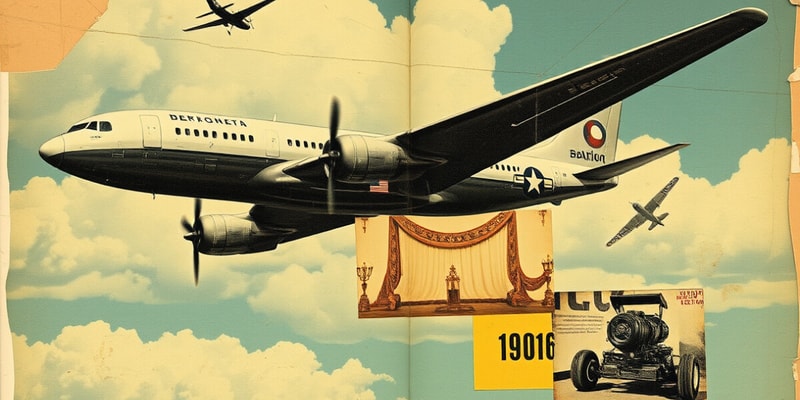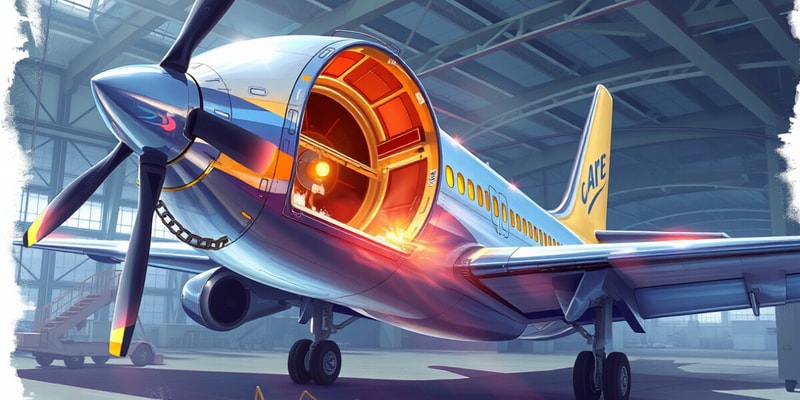Podcast Beta
Questions and Answers
What are the primary materials used for fabric coverings in aircraft before the 1960s?
What major drawback do natural fabric coverings have compared to synthetic fabrics?
What is a significant advantage of synthetic fabric coverings over natural fabrics?
What is a critical concern regarding the long replacement intervals of synthetic fabrics?
Signup and view all the answers
Which of the following is NOT a synthetic fabric used in aircraft coverings?
Signup and view all the answers
What must be completely removed for a comprehensive structural inspection of an aircraft?
Signup and view all the answers
What is the main factor that led to the widespread adoption of synthetic fabrics in aircraft?
Signup and view all the answers
Why is fabric orientation important in aircraft fabric coverings?
Signup and view all the answers
What direction do the warp threads run in a fabric?
Signup and view all the answers
Which fabric has a strength of around 140 lb/in when new?
Signup and view all the answers
What is the purpose of the selvage edge in fabric?
Signup and view all the answers
What is a characteristic of bias fabric orientation?
Signup and view all the answers
What happens to polyester fabric when heat is applied during installation?
Signup and view all the answers
Which of the following statements is true about glass fibre?
Signup and view all the answers
How is Grade A cotton strengthened during manufacturing?
Signup and view all the answers
What is a characteristic of synthetic polyester fabrics?
Signup and view all the answers
What does a pinked edge refer to?
Signup and view all the answers
What is greige fabric?
Signup and view all the answers
What protects polyester fabric from deterioration due to ultraviolet radiation?
Signup and view all the answers
Which tape is used to smooth sharp protrusions and prevent fabric tearing?
Signup and view all the answers
What is the primary function of inter-rib bracing?
Signup and view all the answers
What is a notable risk associated with excessive heat applied to polyester fabric?
Signup and view all the answers
What is the primary use of surface tape in aircraft covering?
Signup and view all the answers
Why is rib-lacing cord important in aircraft fabric covering?
Signup and view all the answers
What is the function of grommets in aircraft fabric?
Signup and view all the answers
How do inspection rings assist in aircraft maintenance?
Signup and view all the answers
What is the main purpose of using special fabric fasteners in aircraft covering?
Signup and view all the answers
Which tool is used to monitor fiber surface temperatures during fabric work?
Signup and view all the answers
What is the role of aircraft dope in fabric covering?
Signup and view all the answers
Which type of dope is known for being highly flammable due to its composition?
Signup and view all the answers
What is required before using fabric covering tools that involve heat for shrinkage?
Signup and view all the answers
How does proper application of dope affect fabric covering?
Signup and view all the answers
What must be done if fastener holes become worn before applying special fabric fasteners?
Signup and view all the answers
Which of the following tools is specifically used to create a continuous series of Vs to prevent unravelling of fabric edges?
Signup and view all the answers
What characteristic of cellulose nitrate dope makes it a less preferable option nowadays?
Signup and view all the answers
What must be controlled during the dope application process to ensure a proper finish?
Signup and view all the answers
What is the primary concern when seaming fabric on an aeroplane?
Signup and view all the answers
What method should be used to sew the blanket on aeroplanes with a Vmo greater than 150 mph?
Signup and view all the answers
What is the minimum breaking strength required for the fabric to remain airworthy if it was originally rated at 80 lb?
Signup and view all the answers
What is essential to do before applying the fabric to the airframe structure?
Signup and view all the answers
What is the main reason for re-covering an aircraft's fabric?
Signup and view all the answers
What temperature does polyester fabric shrink nearly 10%?
Signup and view all the answers
Which materials are essential for personnel protection during the fabric covering process?
Signup and view all the answers
What method is commonly used to attach fabric to wing ribs in aircraft?
Signup and view all the answers
What is rib lacing designed to prevent?
Signup and view all the answers
What is the purpose of anti-chafe tape when covering an aircraft?
Signup and view all the answers
Which covering method involves pre-sewn envelopes to minimize installation hand-stitching?
Signup and view all the answers
What type of knot is typically used for the first stitch when lacing a rib?
Signup and view all the answers
For aeroplanes with a maximum operating velocity greater than 220 knots, what should be used under rib stitching?
Signup and view all the answers
What should be ensured about the aircraft before covering it with new fabric?
Signup and view all the answers
What is the minimum frequency for determining the breaking strength of fabric coverings during inspections?
Signup and view all the answers
What is required after covering seams and rib stitching with surface tape?
Signup and view all the answers
What is typically required in the work environment for proper fabric covering preparation?
Signup and view all the answers
What is a common material used to cement polyester fabric to the airframe structure?
Signup and view all the answers
What primary issue can excess tension in fabric cause in aircraft structures?
Signup and view all the answers
Why is it important to remove any rib-stitching fasteners before pulling fabric free from the airframe?
Signup and view all the answers
What should avoid being too tight when positioning the fabric on the structure?
Signup and view all the answers
Which factor is a common cause of loose or wrinkled fabric in aircraft?
Signup and view all the answers
What is a common characteristic of polyester fabric used in aircraft re-covering?
Signup and view all the answers
What process follows after the fabric has been glued to the structure?
Signup and view all the answers
What is the recommended method for repairing polyester fabric coverings?
Signup and view all the answers
What is the role of ventilation when working with materials like nitrate dope?
Signup and view all the answers
What type of stitch is preferred due to its strength and durability for sewing polyester fabric?
Signup and view all the answers
How should metal parts be treated prior to applying new fabric covering?
Signup and view all the answers
Which issue results from cracks in the coatings of aircraft fabric?
Signup and view all the answers
What should workers do to prevent static electricity build-up during the covering process?
Signup and view all the answers
What must all materials used for fabric repairs match?
Signup and view all the answers
What is the function of jigs and work stands during the fabric covering process?
Signup and view all the answers
How should areas showing lifting fabric covering be addressed?
Signup and view all the answers
What is the major risk of excess dope film on new fabric covers?
Signup and view all the answers
What is the primary advantage of butyrate dope over nitrate dope?
Signup and view all the answers
Why is a fungicidal paste applied to untreated cotton and linen fibres?
Signup and view all the answers
What is a common consequence of insufficient dope film quality?
Signup and view all the answers
What should be given particular attention during fabric inspections on aircraft?
Signup and view all the answers
What is a primary use of plasticisers in dope formulations?
Signup and view all the answers
What does the general procedure for inspecting a damaged fabric area involve?
Signup and view all the answers
Which type of dope is typically recommended for heat-shrunk polyester fabrics?
Signup and view all the answers
What is the purpose of adding a retarder to dope?
Signup and view all the answers
How do aluminium flakes help in dope applications?
Signup and view all the answers
What characteristic makes synthetic dopes suitable for initial base coats in certain aircraft coverings?
Signup and view all the answers
What happens to dope films over time due to ultraviolet rays?
Signup and view all the answers
What are fabric primers used for in covering processes?
Signup and view all the answers
Which type of dope has the best encapsulation characteristics for attaching fabric to the structure?
Signup and view all the answers
What is a common function of accelerators in dope applications?
Signup and view all the answers
What significant difference does modern synthetic fabric covering present compared to traditional methods?
Signup and view all the answers
What is the main drawback of butyrate dope compared to nitrate dope?
Signup and view all the answers
What is the role of thinner in dope application?
Signup and view all the answers
What is the primary purpose of installing fabric gussets?
Signup and view all the answers
What type of dope is applied as a sealer coat before rib stitching?
Signup and view all the answers
Which area should be prioritized for inspection due to rapid deterioration?
Signup and view all the answers
What is a significant cause of deterioration in polyester fabric used for aircraft?
Signup and view all the answers
What indicates that a fabric needs replacement during testing?
Signup and view all the answers
What is the method used to determine the breaking strength of aircraft fabric?
Signup and view all the answers
Which of the following is true about the Seyboth tester?
Signup and view all the answers
What should be done if excessive deterioration is found during an inspection?
Signup and view all the answers
What is one consequence of fabric inspection stripping?
Signup and view all the answers
What is the purpose of the cross coats of Butyrate dope applied after sealing?
Signup and view all the answers
What type of fabric is susceptible to accelerating deterioration when darker colors are used?
Signup and view all the answers
How often should fabric inspections be performed?
Signup and view all the answers
Why might engineers prefer non-destructive testing techniques over cutting test strips?
Signup and view all the answers
What type of coating is applied in the final three coats before finishing?
Signup and view all the answers
Study Notes
Early Fabric Coverings
- Majority of aircraft fabric coverings before the 1960s used organic materials like Cotton and Linen.
- Fabric was treated with dope to tighten and protect it from moisture and sunlight.
- Post-1960s, synthetic fabrics (e.g., polyester, glass fiber) emerged as the new standard.
- Natural fabrics face issues such as flammability, mildew, and UV sensitivity, necessitating replacement every 10 years.
- Synthetic fabrics can last up to 25 years, increasing the risk of undetected structural deterioration due to less frequent inspections.
Modern Synthetic Fabric Coverings
- Cost and durability shifted nearly all aircraft coverings to synthetic, STC-approved materials.
- Common synthetic fabrics include Ceconite®, Poly-Fiber®, and Superflite®.
- Effective structural inspection requires complete fabric removal.
Fabric Orientation and Key Terms
- Fabric Orientation: Critical for maintaining structural integrity; orientation begins with placement and use of reinforcing materials.
- Warp and Fill: Warp threads run lengthwise (0° direction), while fill threads run perpendicular (90°). More threads in warp make it stronger.
- Selvage Edge: Tightly woven edge parallel to the warp that prevents fraying; must be removed before application.
- Bias: Fabric orientation at 45° to warp, allowing easier manipulation for shapes.
- Thread Count: Refers to threads per inch in warp or fill.
- Pinked Edge: Fabric cut in Vs for fray prevention.
- Greige Fabric: Unshrunk polyester fabric straight from the loom.
Organic Fabric Materials
- Grade A Cotton: Mercerised for strength and durability; identified by its off-white color.
- Irish Linen: Made from flax, stronger than cotton (140 lb/in), historically common in aircraft but replaced largely by synthetic options.
Inorganic Fabric Materials
- Polyester Fabric: Durable, resistant to moisture and chemicals but vulnerable to UV radiation, requiring protective coatings.
- Glass Fiber: Stronger than cotton and polyester, not prone to moisture decay, but must be tensioned during installation.
Additional Fabric Covering Materials
- Anti-Chafe Tape: Self-adhesive cloth tape used to protect areas prone to wear.
- Reinforcing Tape: Used under rib lacing to prevent pull-through.
- Surface Tape: Covers seams for a smoother finish and prevents loosening during flight.
- Rib-Lacing Cord: Secures fabric to ribs, preventing lift-induced fabric detachment.
Fabric Covering Tools
- Fabric Iron: For heat-shrinking synthetic fabrics; must be temperature calibrated.
- Sealing Iron: Small iron for tight spaces, requiring similar calibration.
- Stitch Needles and Spring Clamps: Various needle types for sewing and clamps for holding fabric.
- Fibre Thermometer: Monitors surface temperatures during heat application.
- Pinking Shears and Sharp Blades: For preparing fabric edges and cutting processes.
Aircraft Dope
- Refers to cellulose-based coatings used to protect fabric from environmental harm.
- Types include nitrate, butyrate, and synthetic dopes, each serving specific adhesive and protective functions.
- Must control application temperature and humidity for best results, and good ventilation is critical due to toxicity.
Dope Types
- Nitrate Dope: Highly flammable, historical, used for adhesion and fabric finishing.
- Butyrate Dope: Less flammable, used extensively today with better tautening properties.
- Synthetic Dopes: Modified for flexibility and reduced tautening in polyester fabrics.
Additives, Primers, and Coatings
- Fungicidal Paste: Used on organic fibers to kill potential mildew or fungus.
- Rejuvenator: Restores flexibility by softening and reintroducing plasticisers to degraded dope.
- Aluminium Paste: Blocks UV rays, applied as a final protective layer.
- Retarders and Accelerators: Adjust drying times based on application conditions.
Covering Procedures
- Modern synthetic coverings are lightweight, economical, and visually appealing.
- Repair and maintenance processes differ significantly from those for metallic and composite structures.### Fabric Maintenance and Repair in Aircraft
- Covering materials and attachment methods vary significantly between aircraft models, impacting durability and repair strategies.
- Major repairs include the replacement of fabric coverings, which must adhere to aviation regulations and be performed by authorized personnel.
- Fabric is airworthy until its strength deteriorates below 70% of the original breaking strength; for example, Grade A cotton's breaking strength becomes un-airworthy at 56 lb from a new strength of 80 lb.
- Regular inspections at 100-hour intervals and annual checks assess fabric strength to determine the necessity of re-covering.
Preparation for Fabric Covering Work
- Workshop environment should control temperature, humidity, and ventilation; additives can help if ideal conditions aren't attainable.
- Essential tools include jigs for tracking structural integrity and proper safety gear due to toxic substances involved in the covering process, like nitrate dope.
- Disassembly of the aircraft is necessary to access and inspect structural components prior to installing new fabric.
Fabric Covering Methods
- Envelope Method: Pre-sewn envelopes minimize hand-stitching during installation, aligning seams with the wing’s structure.
- Blanket Method: Involves wrapping a large piece of fabric around the wing, requiring careful sewing or doping to ensure integrity; less common in high-velocity aircraft due to labor intensity.
Seams and Adhesion
- Fabric seams should maximize strength and durability, typically placed over structural components.
- Polyester fabric is usually glued rather than sewn; a multi-step adhesive application is required for proper attachment.
- Heat shrinking post-adhesion ensures tautness without damage; care must be taken to follow temperature protocols.
Rib Lacing and Gussets
- Rib lacing secures fabric to wing ribs using cord to prevent billowing; method involves pre-punched holes for cord passage.
- Gussets reinforce areas around cable openings and strut fittings, preventing wear and structural breaches.
Coating the Fabric
- A sequence of coats, often involving nitrate dope, provides waterproofing and UV protection; critical for extending fabric life.
- Coating procedures vary by manufacturer but generally include application of sealer coats and cross coats.
Inspections and Testing
- Routine inspections should focus on high-risk areas (e.g., sun exposure, heat absorption) and assess for physical wear or decay.
- Testing devices like the Maule and Seyboth testers help gauge fabric strength; however, substantial holes result from testing, indicating a need for repairs.
Common Fabric Defects
- Excess Tension: Observable tension issues can warp airframe components; often due to dope film shrinking over time.
- Loose Fabric: Muffling or rippling in flight indicates improper installation or structural issues; polyester coverings are particularly sensitive to slack and heat application.
Conclusion
- Maintaining fabric integrity is vital for aircraft safety; adherence to inspection schedules, preparation protocols, and proper repair methods ensures longevity and performance of aircraft coverings.### Fabric Coating and Wrinkles
- Temporary wrinkles can appear in fabrics coated with dope due to moisture from rain, fog, or dew, causing expansion of poor-quality dope film.
- Moving aircraft from cold to warm environments can induce wrinkles from rapid thermal expansion of thick coatings.
Coating Cracks
- Cracks in coatings expose fabric to deterioration, necessitating sealing or removal of the compromised coatings.
- Immediate area repair involves applying new coatings or recovering the component to maintain integrity.
Fabric Repair in Aircraft
- Aircraft fabric repairs are essential; damaged areas must be assessed to ensure that only the fabric is affected, avoiding structural damage.
- Repair materials must match or exceed original material quality and type, ensuring airworthy conditions are restored.
Repair Instructions and Considerations
- Identify the fabric type used for the covering in need of repair through logbook references or manufacturer data.
- The nature of repairs is influenced by the extent of damage and fabric type, with many repairs utilizing new adhesives per STC procedures.
- Cotton fabric repairs often involve sewing, while polyester fabric repairs predominantly use cementing techniques.
- Repair instructions for polyester fabric focus on cemented methods, preferred by technicians for simplicity and maintained strength over sewn methods.
Example of Fabric Repair
- When fabric is cut, the surrounding area is stitched, tensioned, and then covered with surface tape for finishing to ensure durability.
Studying That Suits You
Use AI to generate personalized quizzes and flashcards to suit your learning preferences.
Description
Explore the evolution of aircraft fabric coverings from organic materials like cotton and linen to modern synthetic fabrics such as polyester and glass fiber. This quiz delves into the advantages and disadvantages of each type, along with key terms such as fabric orientation. Test your knowledge on how these materials impact aircraft maintenance and safety.





